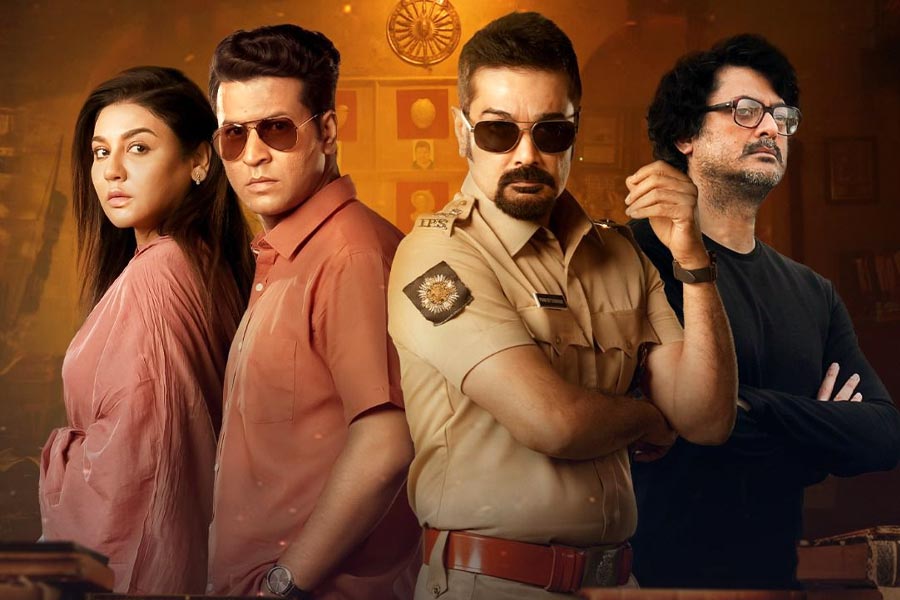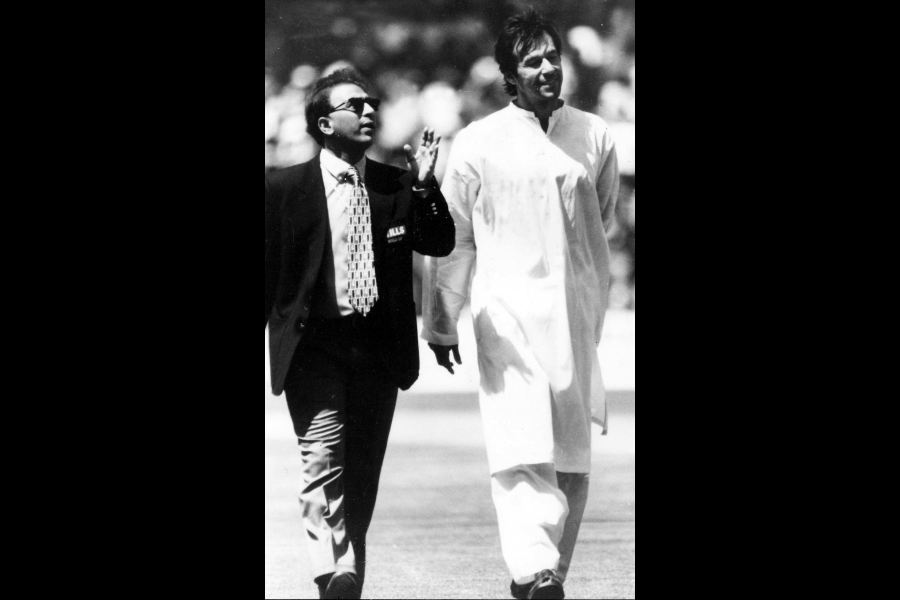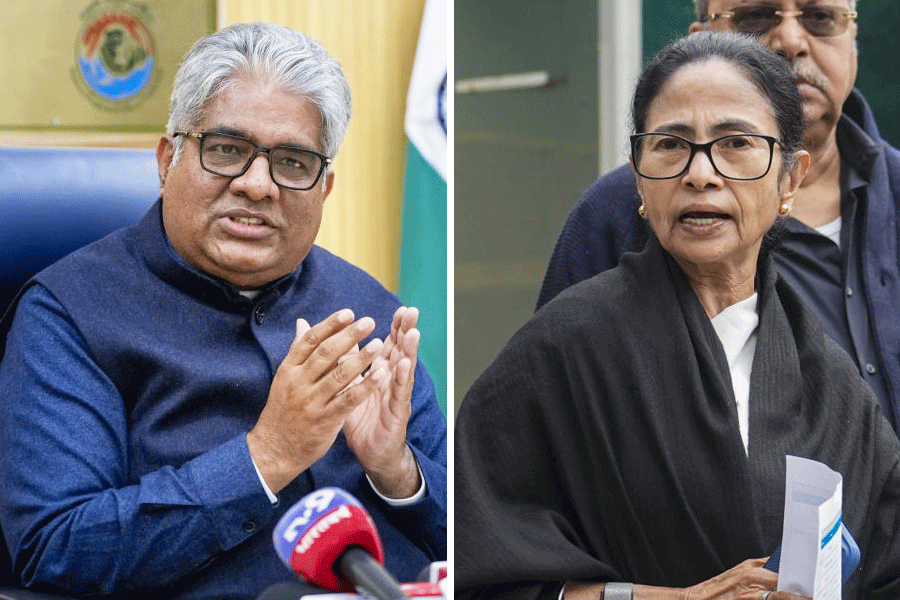Once upon a time, there was just the universe. Then came the Marvel Cinematic Universe. Followed by the multiverse. Somewhere in between Rohit Shetty added his copverse to the mix and YRF their spyverse. Now, Srijit Mukherji creates the first ‘verse’ in the Bengali film landscape.
And since it is Srijit, with his penchant for literary allusions, he gets the verse quite literally. Is he the only Indian filmmaker to weave in poetry and serial killing in the same narrative? He did it seamlessly in Baishe Srabon, with the Hungryalists and the character of Nibaron Chakraborty (Goutam Ghose), a hat-tip to Tagore’s alter ego in Sesher Kobita. In Dawshom Awbotaar he goes a step further, not only incorporating none other than Rainer Maria Rilke and one of his greatest poems ‘Go to the Limits of Your Longing’ and its unforgettable lines — ‘Let everything happen to you: beauty and terror. Just keep going. No feeling is final’ – but also making it a pivotal aspect of the plot and the denouement.
As someone who adores the poetry of Rilke, the ecstasy of finding him in the film — in a translation attributed to Nibaron Chakraborty, a ‘self-reflexive nod’ (Srijit’s own phrase) to the filmmaker – is ‘almost’ enough for me to overlook its many limitations, and say, ‘To hell with everything else — if a filmmaker has the chutzpah to refer to and quote Rilke in a film about cops and serial killers, I am willing to go with the flow.’
The operative word there is ‘almost’. Because there are a number of things about Dawshom Awbotaar that Rilke cannot camouflage. Or to paraphrase another poet and poem (Faiz’s ‘Mujhse pehli si mohabbat’) – ‘Aur bhi dukh hain zamane mein mohabbat ke siwa’: there are other weaknesses in the film, despite Rilke.
Those who have followed Srijit’s career will know by now that Dawshom Awbotaar brings together two almost iconic characters from the filmmaker’s oeuvre – Probir Roy Chowdhury (Prosenjit Chatterjee) in Baishe Srabon and Bijoy Poddar (Anirban Bhattacharya) in Vinci Da – setting them in a sort of prequel to the former. A serial killer is on the loose and his modus operandi seems to be using the 10 avatars of Vishnu for each kill – red-bellied piranhas, a tortoise decoration piece, an inventive take on Narasimha slaying Hiranyakashipu (a murder in a lift), and so on and so forth. So, the resident serial killer expert Probir is roped in, and he is joined by Poddar.
There are few filmmakers who get the serial killer as well as Srijit does (I have often been tempted to tell him, quoting another song, ‘I want to look inside your head’) and can bring in literary and mythological references to his narrative with as much aplomb. Fewer who probably do the pun so well and who can employ the spoken word to such telling effect in the screenplay. He does these so well that he is prone to overdoing it, which is what happens to Dawshom Awbotaar. Srijit seems to be too enamoured of his characters and their world. A creator is entitled to love what he creates, but when he fails to distance himself from his creation, look back at it objectively, he runs the risk of becoming self-indulgent. Dawshom Awbotaar reeks of self-indulgence.
Of course, when a film is a take-off on two previous films and their characters, you are operating within some constraints. Certain character traits, and interactions arising therefrom, have been pre-decided. But surely one can go beyond the whisky/Bournvita and ‘mudi dokaan /sir/ babu’ references. One can go a little easy on the relentless punning which has begun to pall with overuse – what once came across as fun wordplay is now plain irritating smart-alecky. The relationship between Roy Chowdhury and Pakrashi in Baishey or Bijoy Poddar’s comebacks in Vinci Da were organic to the narrative, which is what gave the films their edge. Dawshom Awbotaar feels like a retread of familiar territory. The city’s underbelly, the handheld shots snaking their way through dingy alleys, the free-flowing cuss words – the filmmaker has been there, done that, as has his audience. From any other director, this could be considered a decent outing, even rather good in parts. Coming from Srijit, it feels like the work of a director resting on his laurels, playing safe.
The film’s length is another major drawback. At 154 minutes, it overstays its welcome by at least half-an-hour. The animated Dashavatar stories, for example, are needless in the scheme of a thriller. And the post-climactic epilogue between Poddar and Moitreyee (Jaya Ahsan) are a drag on both the narrative and viewer patience. For a filmmaker as intelligent as Srijit, why couldn’t he leave that to the viewer’s imagination? There’s also careless inattention to detail. The chase after the third murder, for instance. Why should the killer wait for the cops to arrive before making a run for it? Only to allow the filmmakers the indulgence of a chase? And the newly minted Story bookstore, which started operations earlier this year, in a narrative that ostensibly predates Baishe? Then there’s the pre-climactic exchange between Biswaroop (Jisshu Sengupta) and Moitreyee. Given the denouement that unfolds, I came away with the nagging feeling – I might need to watch the film again to confirm this – that there’s something decidedly off about that (why would they, with their histories, be having a conversation like that, unless it is the filmmaker taking the viewer on a wilfully misleading merry-go-round?).
The parts of the film that work best for me are the understated, almost throwaway bits – Poddar teaching a group of children, and his muted reaction to a sex worker who has come to drop off her child, or Poddar and Moitreyee exchanging notes on the impossibility of retaining their sanity given the demands of their professions. The film needed a few more of those to emerge from the shadows of the filmmaker’s earlier works.
On the evidence of what Dawshom Awbotaar has on offer, it is time that the filmmaker casts himself in a new avatar. And soon.
(Shantanu Ray Chaudhuri is a film and music buff, editor, publisher, film critic and writer)










